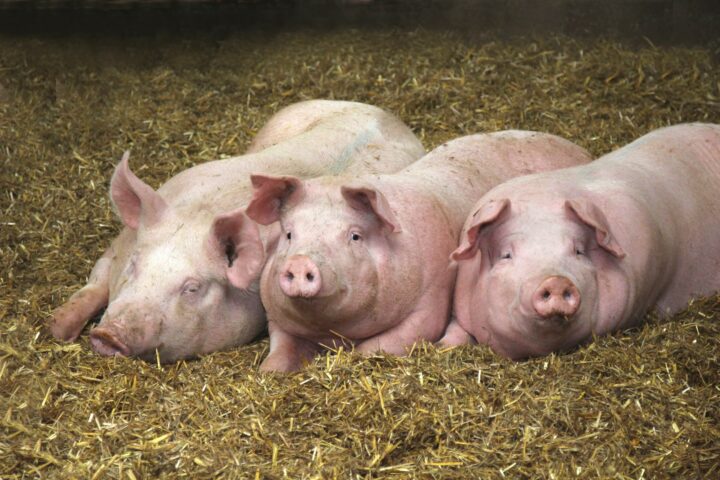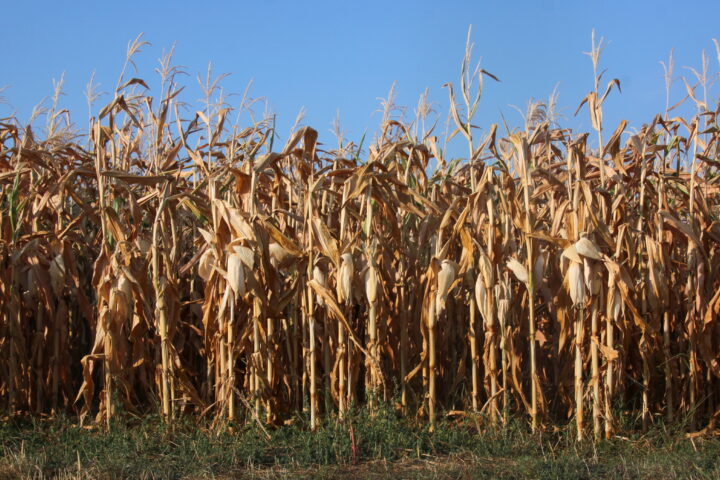
Using CRISPR/Cas9 to fight potato blight
Potato blight is the potato farmer’s greatest enemy. It spreads quickly in moist conditions and, if left untreated, can lead to devastating crop failures. The Nobel Prize-winning CRISPR/Cas method now makes it possible to breed resistant varieties and may reduce the use of pesticides in agriculture.
Monday, August 23, 2021
In brief
- Late blight causes massive crop losses in potatoes.
- Genome editing could soon be used to breed varieties resistant to the fungal disease.
- The big advantage: massively fewer pesticides would be needed.
The unusually wet summer in 2021 helped spread potato blight to potato fields. The culprit for the world’s worst potato disease is the root disease Phytophthora infestans. Its spores need the wet surfaces of leaves to germinate and infect the plant. The spores are quickly scattered by the wind and can quickly cover an entire field. In the past century, potato blight has led to famines. Because it spreads so quickly, protecting potatoes is a challenge for farmers even in normal years.
Pesticides are effective
To date, the best option for preventing pathogens has been the consistent use of synthetic pesticides (as well as copper in organic farming). However, treating potatoes with pesticides has disadvantages. They must be sprayed several times, depending on the severity of the infestation. During especially wet weather – as was the case this summer – farmers can no longer drive over their fields with their equipment. As a result, they are no longer able to treat the potatoes. The problem with copper is that, as a heavy metal, it enriches the soil, presenting a hazard to various soil organisms.
To address these issues, scientists have long conducted research into potato varieties that are resistant against potato blight. However, they have not succeeded in developing resistant strains without losing other characteristics in existing varieties using traditional breeding methods. By contrast, researchers have managed to insert resistant genes from wild potatoes in established varieties using genetic engineering. The resulting potatoes proved to be resistant against Phytophthora infestans over the long term. However, because they are classified as genetically modified organisms (GMOs) in Europe, they cannot be cultivated.
Resistance with the help of “genetic scissors”
Gene editing offers a new option for making potatoes resistant against potato blight. A team of researchers from Sweden and Denmark have identified genes that make potatoes susceptible to fungus (known as susceptibility genes or S genes). Using the CRISPR/Cas9 genetic scissors, the researchers cut the DNA of potatoes in two places in order to remove the section between them. The resulting varieties were much more resistant against the fungal pathogens than the initial varieties. In addition, the other characteristics appeared to be unchanged. The varieties now need to be examined in release experiments.
Using gene editing to remove S genes represents a major opportunity for breeding disease-resistant plants. This is because in contrast to traditional breeding methods the initial varieties retained their favorable characteristics – such as their flavor, appearance, regular shape, tender yet hearty peel, etc. Gene editing may thus help to reduce the use of pesticides. However, gene-edited plants are considered GMO in Switzerland and the EU. They cannot be cultivated. But if Switzerland, unlike the hesitant EU, wants to take a step toward sustainable and resource-efficient agriculture, it can no longer make do without the use of innovative technologies. It should seize the opportunity it represents for agriculture and Switzerland as a research center and avoid including low-cost genetic scissors in a moratorium on genetic engineering. This is because moratoriums harm research careers.
Related articles

What’s Really in Your Shopping Basket
Genetic engineering in our shopping basket? Yes – and much more often than we think. Whether it’s pasta, bread or vegetables: many of the everyday products we consume come from mutation breeding, which involves altering the genome and is considered safe. It’s high time to debunk the common myths.

Genomic breeding methods are not given a chance to prove themselves
Modern genomic breeding methods are legally classified as genetic engineering – and are therefore still effectively blocked. Yet we have been eating genetically modified plants for decades, just under the label of “classical mutagenesis.” The new, more precise techniques are regulated more strictly than the old ones, even though they are considered safer from a scientific perspective. A contradiction that urgently needs to be corrected. The EU is setting a good example.

No Pig Business: Why Testicle-Free Boars Are a Clear Win for Animal Welfare
New breeding methods are opening up new possibilities in both plant and animal breeding. They allow targeted genetic changes that can make animals more resilient, adaptable, and healthier.

Stagnation instead of progress: Switzerland risks falling behind in new breeding techniques
An overview article in Schweizer Bauer shows how much the new breeding methods are preoccupying farming circles. Once the consultation process on the federal law has been completed, a bill is expected – then it will become clear whether there is actually the political will to approve it.

